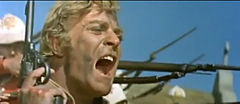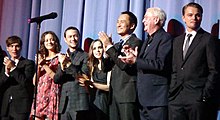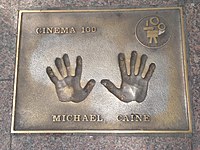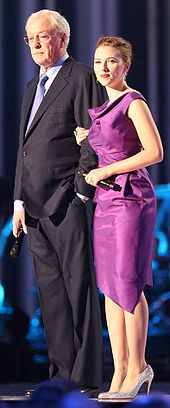4:01 PM the spy Harry Palmer in The Ipcress File (1965), and title character in Alfie (1966)./Bullet to Beijing (1995) | |
================= 960s// Funeral in Berlin (1966), Billion Dollar Brain (1967),Bullet to Beijing (1995) and Midnight in Saint Petersburg (1995).Michael Caine in the trailer for Zulu (1964)
Caine continued to appear on television, in serials The Golden Girl and No Wreath for the General, but was then cast in the play The Compartment, written by Johnny Speight, a two-hander also starring Frank Finlay. This was followed by main roles in other plays including Somewhere for the Night, a Sunday-Night Play written by Bill Naughton, another two-hander by Johnny Speight, The Playmates, and two editions of BBC plays strand First Night, Funny Noises with Their Mouths and The Way with Reggie (both 1963). He also acted in radio plays, including Bill Naughton's Looking for Frankie on the BBC Home Service (1963) and Ping Pong on the BBC Third Programme (1964). A big break came for Caine when he was cast as Meff in James Saunders' Cockney comedy Next Time I'll Sing To You, when this play was presented at the New Arts Theatre in London on 23 January 1963.[26] Scenes from the play's performance were featured in the April 1963 issue of Theatre World magazine.[27] When this play moved to the Criterion in Piccadilly with Michael Codron directing, he was visited backstage by Stanley Baker, one of the four stars in Caine's first film, A Hill in Korea, who told him about the part of a Cockney private in his upcoming film Zulu, a film Baker was producing and starring in. Baker told Caine to meet the director, Cy Endfield, who informed him that he already had given the part to James Booth, a fellow Cockney who was Caine's friend, because he looked more Cockney than Caine did. Endfield then told the 6'2" Caine that he did not look like a Cockney but like an officer, and offered him a screen test for the role of a snobbish, upper class officer after Caine assured him that he could do a posh accent. Caine believes Endfield offered him, a Cockney, the role of an aristocrat because, being American, he did not have the endemic British class-prejudice. Though he tested poorly, Endfield gave him the part that would make him a film star.[28] Location shooting for Zulu took place in Natal, South Africa, for 14 weeks in 1963.[29][30][31] According to his 2011 autobiography The Elephant to Hollywood, Caine had been signed to a seven-year contract by Joseph E. Levine, whose Embassy Films was distributing Zulu. After the return of the cast to England and the completion of the film, Levine released him from the contract, telling him, "I know you're not, but you gotta face the fact that you look like a queer on screen." Levine gave his contract to his Zulu co-star James Booth.[32] Subsequently, Caine's agent got him cast in the BBC production Hamlet at Elsinore (1964) as Horatio, in support of Christopher Plummer's Hamlet. Horatio was the only classical role which Caine, who had never received dramatic training, would ever play. Caine wrote, "...I decided that if my on-screen appearance was going to be an issue, then I would use it to bring out all Horatio's ambiguous sexuality."[33] Caine's roles as effete-seeming aristocrats were to contrast with his next projects, in which he was to become notable for using a regional accent, rather than the Received Pronunciation hitherto considered proper for film actors. At the time, Caine's working class Cockney, just as with The Beatles' Liverpudlian accents, stood out to American and British audiences alike. Zulu was closely followed by two of his best-known roles: the spy Harry Palmer in The Ipcress File (1965), and the womanising title character in Alfie (1966). He went on to play Palmer in a further four films, Funeral in Berlin (1966), Billion Dollar Brain (1967), Bullet to Beijing (1995) and Midnight in Saint Petersburg (1995). Caine made his first film in the United States in 1966, after an invitation from Shirley MacLaine to play opposite her in Gambit. During the first two weeks, whilst staying at the Beverly Hills Hotel, he met long-term friends John Wayne and agent "Swifty" Lazar.[34] 1970sMichael Caine in the trailer for Get Carter (1971)
After working on The Italian Job with Noël Coward, and a solid role as RAF fighter pilot Squadron Leader Canfield in the all-star cast of Battle of Britain (both 1969), Caine played the lead in Get Carter (1971), a British gangster film. Caine was busy with successes including Sleuth (1972) opposite Laurence Olivier, and John Huston's The Man Who Would Be King (1975) co-starring Sean Connery which received widespread acclaim.[35] The Times applauded the "lovely double act of Caine and Connery, clowning to their doom", while Huston paid tribute to Caine's improvisation as an actor: "Michael is one of the most intelligent men among the artists I've known. I don't particularly care to throw the ball to an actor and let him improvise, but with Michael it's different. I just let him get on with it."[35] In 1976 he appeared in the screen adaptation by Tom Mankiewicz of the Jack Higgins novel The Eagle Has Landed as Oberst (Colonel) Kurt Steiner, the commander of a Luftwaffe paratroop unit disguised as Polish paratroopers, whose mission was to kidnap or kill the then-British Prime Minister Winston Churchill, alongside co-stars Donald Sutherland, Robert Duvall, Jenny Agutter and Donald Pleasence. Subsequently, in 1978, he starred in The Silver Bears, an adaptation of Paul Erdman's (1974) novel of the same name. Caine also was part of an all-star cast in A Bridge Too Far (1977). ================================================================== 1980sBy the end of the decade, he had moved to the United States, but his later choice of roles was frequently criticised—something to which he has referred with self-deprecating comments about taking parts strictly for the money. Caine then averaged two films a year, but these included such failures as the BAFTA Award-nominated The Magus (1968), the Academy Award-nominated The Swarm (1978), Ashanti (1979) (which he claimed were his worst three films), Beyond the Poseidon Adventure (1979), The Island (1980), The Hand (1981) and a reunion with his Sleuth co-star Laurence Olivier in The Jigsaw Man (1982). Although Caine also took better roles, including a BAFTA-winning turn in Educating Rita (1983), an Oscar-winning one in Hannah and Her Sisters (1986),[36] and a Golden Globe-nominated one in Dirty Rotten Scoundrels (1988), he continued to appear in poorly received films such as Blame It on Rio, the Dick Clement and Ian La Frenais comedy Water, the critical-commercial flop Jaws: The Revenge (1987) (about which he had mixed feelings concerning the production and the final cut), and Bullseye! (1990). On Jaws: The Revenge, Caine said "I have never seen the film, but by all accounts it was terrible. However, I have seen the house that it built, and it is terrific."[37][38] His other successful films (critically or financially) were the 1978 Academy Award-winning California Suite, the 1980 Golden Globe-nominated slasher film Dressed to Kill, the 1981 war film Escape to Victory featuring Sylvester Stallone and footballers from the 1960s and 1970s, including Pelé and Bobby Moore, the 1982 film Deathtrap, and the 1986 Academy Award-nominated Mona Lisa. In 1987, Caine narrated Hero, the official film of the 1986 FIFA World Cup.[39] He also starred in Without a Clue, portraying Sherlock Holmes and also acted as Chief Insp. Frederick Abberline in the 1988 TV series Jack the Ripper. 1990sIn the 1990s, he found good parts harder to come by. He played the mysterious bartender Mike in Mr. Destiny in 1990. A high point came when he played Ebenezer Scrooge in the critically acclaimed The Muppet Christmas Carol (1992). He played the beleaguered stage director Lloyd Fellowes in the film adaptation of Noises Off (1992). He also played a villain in the Steven Seagal film On Deadly Ground (1994). He was in two straight to video Harry Palmer sequels and a few television films. However, Caine's reputation as a pop icon was still intact, thanks to his roles in films such as The Italian Job and Get Carter. His performance in Little Voice (1998) was seen as something of a return to form, and won him a Golden Globe Award. Better parts followed, including The Cider House Rules (1999), for which he won his second Academy Award for Best Supporting Actor.[40] 2000sCaine in London at the European premiere of The Dark Knight, July 2008
In the 2000s, Caine appeared in Miss Congeniality (2000), Last Orders (2001), The Quiet American (2002), for which he was Oscar-nominated, and others. Several of Caine's classic films have been remade, including The Italian Job, Get Carter, Alfie and Sleuth. In the 2007 remake of Sleuth, Caine took over the role Laurence Olivier played in the 1972 version and Jude Law played Caine's original role. Caine is the only actor to have played a starring role in two different versions of the same movie.[citation needed] In an interview with CNN, Law spoke of his admiration for Caine: "I learned so much just from watching how he monitored his performance, and also how little he has to do. He's a master technician and sometimes he was doing stuff I didn't see, I couldn't register. I'd go back and watch it on the monitor, it was like 'Oh my God, the amount of variety he's put in there is breathtaking.[3] Caine also starred in Austin Powers in Goldmember (2002) as Austin's father and in 2003 he co-starred with Robert Duvall in Secondhand Lions. Caine played family elder Henry Lair in the 2004 film, Around the Bend. In 2005, he was cast as Bruce Wayne's butler Alfred Pennyworth in the first production of the new Batman film series, Batman Begins. Also in 2005, he played as Isabel's (Nicole Kidman) father in Bewitched.In 2006, he appeared in the films Children of Men and The Prestige. In 2007 he appeared in Flawless, and in 2008 and 2012 he reprised his role as Alfred in Christopher Nolan's critically acclaimed Batman sequels, The Dark Knight and The Dark Knight Rises as well as starring in the British drama Is Anybody There?, which explores the final days of life. It was reported by Empire magazine that Caine had said that Harry Brown (released on 13 November 2009) would be his last lead role.[41] Caine later declared (in the Daily Mirror) that he had been misquoted by the magazine.[42] 2010sCaine (second from right) with the cast of Inception at the 10 July premiere in 2010
Caine appeared in Christopher Nolan's science fiction thriller Inception as Prof. Stephen Miles, Cobb's (Leonardo DiCaprio) mentor and father-in-law. He voiced Finn McMissile in Pixar's 2011 film Cars 2 and also voiced a supporting role in the animation, Gnomeo & Juliet. He also starred in the 2012 film Journey 2: The Mysterious Island, as Josh Hutcherson's character's grandfather; the film also featured Dwayne Johnson and Vanessa Hudgens. Caine reprised his role as Alfred Pennyworth in the Batman sequel, The Dark Knight Rises, which was released in July 2012. He appeared in Christopher Nolan's 2014 science-fiction film, Interstellar as Dr. Brand.[43] Caine co-starred in Kingsman: The Secret Service (2015), by director Matthew Vaughn.[44] He also appeared in the lead role of retired composer Fred Ballinger in the comedy-drama film Youth, for which he received widespread acclaim. In October 2015, Caine read Hans Christian Andersen's "Little Claus and Big Claus" for the children's fairytales app GivingTales in aid of UNICEF, together with Sir Roger Moore, Stephen Fry, Ewan McGregor, Dame Joan Collins, Joanna Lumley, David Walliams, Charlotte Rampling and Paul McKenna.[45] Awards and honoursMichael Caine's handprints in Leicester Square, London
Caine has been Oscar-nominated six times, winning his first Academy Award for the 1986 film Hannah and Her Sisters, and his second in 1999 for The Cider House Rules, in both cases as a supporting actor. His performance in Educating Rita in 1983 earned him the BAFTA and Golden Globe Award for Best Actor. He was appointed Commander of the Order of the British Empire (CBE) in the 1992 Queen's Birthday Honours,[46] and in the 2000 Birthday Honours he was knighted as Sir Maurice Micklewhite CBE by Elizabeth II at Buckingham Palace.[47][48] In a tribute to his background, he stated: "I was named after my father and I was knighted in his name because I love my father. I always kept my real name - I'm a very private and family-orientated person."[49] In 2000 he received a BAFTA Academy Fellowship Award.[50] In 2008, Caine was awarded the prize for Outstanding Contribution to Showbusiness at the Variety Club Awards.[51] On 5 January 2011 he was made a Commander of the Ordre des Arts et des Lettres by France's culture minister, Frédéric Mitterrand.[52] In May 2012, Caine was awarded the Honorary Freedom of the London Borough of Southwark as a person of distinction and eminence of the borough.[53] In popular culture"I kept my cockney accent in order to let other working class boys know that if I made it they could do it too." Caine is regarded as a British cultural icon, with Mairi Mackay of CNN stating: "Michael Caine has been personifying British cool since the swinging sixties. He has brought some of British cinema's most iconic characters to life and introduced his very own laid-back cockney gangster into pop culture. He doggedly retained a regional accent at a time when the plummy tones of Received Pronunciation were considered obligatory. It is a sweet irony that his accent has become his calling card."[3] With his distinctive voice and manner of speaking, Caine is a popular subject for impersonators and mimics.[54] Most Caine impressions include the catchphrase "Not a lot of people know that."[3] The catchphrase emanates from Caine's habit of informing people of obscure "interesting facts" that he has collected.[55] Referring to Caine as having the "biggest mind of useless information", Peter Sellers initiated the catchphrase when he appeared on BBC1's Parkinson show on 28 October 1972 and said:
Over the years Caine himself had parodied the phenomenon, both his catchphrase and his "interesting facts", and has imitated others' impressions of him.[57] In an interview with Michael Parkinson in 2007, Caine commented on the impersonations of his voice, "I can do it. 'Hello. My name is Michael Caine. Not many people know that.' I sound like a bloody moron. You know where they've got me now? On birthday cards. 'It's your birthday today. Not many people know that'. Now they've got me on Satellite navigation. It's me going, 'take the second turn on the right, and you'll wind up right in the shit.'[57] In 1983, Caine used his "not a lot of people know that" phrase as a joke in the film Educating Rita.[3] The British comedy sketch show, Harry Enfield's Television Programme, included a series of sketches in which Paul Whitehouse played a character called Michael Paine; an amalgam of previous Michael Caine impressions, who in a reference to The Ipcress File wears oversized, thick-rimmed glasses and a trench coat. He introduces himself with the line, "My name is Michael Paine, and I am a nosy neighbour" and in a spoof of the stakeout at the beginning of The Ipcress File, recounts to the camera the 'suspiciously' mundane behaviour of his neighbours, before saying, "Not a lot of people know that I know that".[58] A parody of Michael Caine also appears in the animated series Ugly Americans, in the episode "The Dork Knight", which also parodies the film The Dark Knight. In the episode, Caine appears as himself, portrayed in the light of his Alfred Pennyworth interpretation, and constantly annoys the protagonists with endless anecdotes of his career. The 2010 television series The Trip, starring Rob Brydon and Steve Coogan, featured improvised scenes in which the two leads argue over who can do the better Michael Caine impression.[59] Among the lines they repeat in their attempts to outdo each other are, "You were only supposed to blow the bloody doors off!" and, "She was only sixteen" – from The Italian Job and Get Carter, respectively.[59] Craig Ferguson has run segments on his show where he parodies Caine, usually while wearing a space suit.[60] In a 2010 interview with The Telegraph, Caine spoke of the impersonations and how everyone he meets quotes lines at him, to the point he quotes them quoting him.[58] When asked did he ever tire of telling his anecdotes, Caine states: "I enjoy making people laugh. The trick is to tell them against yourself. If you praise yourself your stories aren’t funny."[58] Personal lifeCaine with Scarlett Johansson at the Nobel Peace Prize Concert, December 2008
Caine lives in Leatherhead, Surrey, and is patron to the Leatherhead Drama Festival.[61] He has also lived in North Stoke, Oxfordshire, Clewer near Windsor, Berkshire, Lowestoft in Suffolk and Chelsea Harbour in London. In addition, Caine owns an apartment at the Apogee in Miami Beach, Florida. He still keeps a small flat near where he grew up in south east London. Caine has published two volumes of memoirs, What's It All About? in 1992 and The Elephant to Hollywood in 2010.[62] He was married to actress Patricia Haines from 1955 to 1962. They have a daughter, Dominique (who was named after the heroine of the novel The Fountainhead by Ayn Rand).[63] He dated Bianca Jagger in 1968. Caine has been married to actress and model Shakira Baksh since 8 January 1973. They met after Caine saw her appearing in a Maxwell House coffee commercial and a friend gave him her telephone number. They have a daughter, Natasha Haleema.[64][65] As a Christian married to a Muslim, he says "no questions or issues ever come up" and describes his wife's beliefs as "very benign".[66] Proud of his working class roots, Caine has discussed the opportunities his film career gave him: "I got to play football with Pelé, for God’s sake. And I danced with Bob Fosse."[58] He also became close friends with John Lennon, stating: "With John and I it was a case of bonding because we were both working class and we shared a sense of humour. We were pretending we weren’t who people thought we were."[58] His closest friends today include two former James Bonds, Sean Connery and Roger Moore.[58] Caine quit his 80-a-day cigarette habit in the early 1970s after a lecture by Tony Curtis.[67] Caine is a fan of the sport of cricket. This was alluded to by Gary Oldman, who acted with Caine in the Dark Knight Rises, when he talks about Caine's acting methods: "It's, 'Take one'. He got it. 'Take two', got it. 'Take three', got it. He's just on the money… He doesn't fuck around because he wants to get back to cricket."[68] Some time after his mother died, Caine and his younger brother, Stanley, learned they had an elder half-brother, named David. He suffered from severe epilepsy and had been kept in Cane Hill Mental Hospital his entire life. Although their mother regularly visited her first son in the hospital, even her husband did not know the child existed. David died in 1992.[69] Trivia books written by Caine include Not Many People Know That!, And Not Many People Know This Either!, Michael Caine's Moving Picture Show and Not A Lot of People Know This is 1988. Proceeds from the books went to the National Playing Fields Association, a UK charity which Caine served as Vice President, which aims to protect and promote open spaces for sports and recreation in British cities and towns.[70] In July 2016, Caine changed his name by deed poll to his long-time stage name in order to simplify security checks at airports. "[A security guard] would say, 'Hi Michael Caine,' and suddenly I’d be giving him a passport with a different name on it [Maurice Joseph Micklewhite]. I could stand there for an hour. So I changed my name."[71]
| |
|
| |
| Total comments: 0 | |





